Overview
This article offers a compassionate, step-by-step guide for those seeking legal help with Social Security Disability claims. We understand that navigating this process can be overwhelming, and it's crucial to grasp the various programs available, such as SSDI and SSI. There are key moments when seeking legal assistance becomes essential, and we will walk you through the process of finding a qualified advocate.
By collaborating effectively with your advocate, you can significantly enhance your chances of a successful application. It's common to feel uncertain about the next steps, but rest assured, you're not alone in this journey. We will share statistics that highlight the challenges applicants face, reinforcing the importance of support during this time.
Remember, reaching out for help is a strong first step. Together, we can navigate the complexities of Social Security Disability claims and work towards a brighter future.
Introduction
Navigating the complexities of Social Security Disability benefits can feel overwhelming, especially when you're applying for assistance due to a long-term medical condition. We understand that millions rely on programs like SSDI and SSI for essential financial support, and grasping the nuances of these benefits is crucial for those in need.
However, the journey often becomes daunting—especially when applications are denied or when the documentation process seems insurmountable.
What steps can you take to ensure you receive the help you deserve?
And when is it time to seek legal assistance to bolster your chances of success?
You're not alone in this journey, and we're here to help.
Understand Social Security Disability Benefits
Disability Benefits offer vital financial support for individuals who are unable to work due to a medical condition that is expected to last at least 12 months or may lead to death. It's important to recognize the two primary programs available to assist you:
- Social Insurance Disability Insurance (SSDI): This program is designed for those who have worked and contributed to Social Insurance through taxes. Your eligibility depends on the work credits you’ve accumulated during your employment.
- Supplemental Security Income (SSI): This program supports individuals with limited income and resources, specifically those who are aged, blind, or disabled, regardless of their work history.
Understanding these differences is crucial, as they significantly affect how you submit your application and the paperwork required. As of 2025, around 8.1 million people are receiving SSDI benefits, while 7.3 million individuals benefit from SSI. This knowledge can truly be life-changing. For example, SSDI benefits have been shown to lower poverty rates among recipients. Without this support, half of all adult SSDI beneficiaries under the age of 65 would be living in poverty.
Real-life stories illustrate the importance of these programs. Many individuals have successfully navigated the SSI approval process, securing essential financial support that helps them maintain their independence and quality of life. Financial advisors stress that understanding the nuances of SSDI and SSI is vital for anyone looking for legal help for social security disability to access these important benefits, especially considering ongoing regulatory changes that may affect eligibility and benefit amounts. Remember, you are not alone in this journey; we’re here to help you every step of the way.
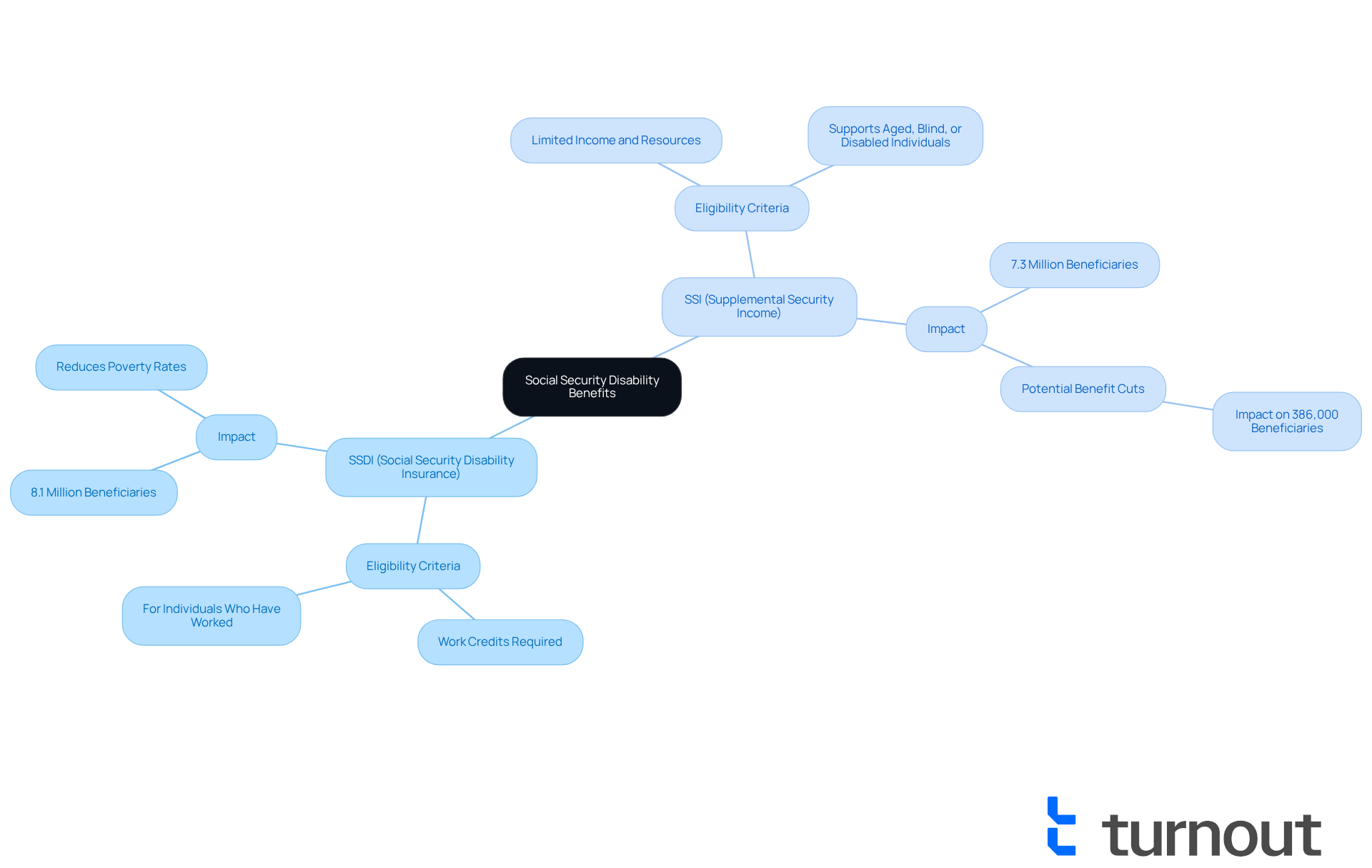
Identify When to Seek Legal Help
If you find yourself in any of the following situations, we encourage you to seek assistance:
- Initial Application Denial: If your application for benefits has been denied, it’s crucial to consult someone experienced in the appeals process. Nearly 67% of initial SSDI applications are denied nationwide, highlighting the importance of knowledgeable support to navigate this complex system. At Turnout, we offer access to skilled non-legal supporters ready to assist you through this challenging experience. Please remember, Turnout is not a law firm and does not provide legal advice.
- Complex Medical Conditions: If your medical condition is complicated or requires extensive documentation, professional help can ensure that all necessary information is accurately presented. Many SSDI claims face denial due to insufficient medical evidence. Collaborating with someone who understands how to compile comprehensive medical records is essential. Turnout's advocates are equipped to help you gather and present this information effectively.
- Lack of Understanding: It’s common to feel overwhelmed by the submission steps or unsure about your eligibility. Seeking guidance can clarify your options and enhance your chances of success. The appeals process can be daunting, but having someone to explain the steps can significantly boost your understanding and confidence. Turnout simplifies access to government benefits and financial support, ensuring you have the necessary resources at your disposal.
- Previous Denials: If you have been denied benefits in the past, consulting someone who can help strengthen your case for reapplication may be beneficial. Understanding the reasons for previous denials can inform a more robust approach to your next application. Many applicants face rejection initially but succeed with the right support. Turnout's expertise in navigating SSD claims can be invaluable in this regard.
- Significance of Expert Support in Appeals: The landscape for Social Insurance Disability appeals is evolving, making expert support increasingly beneficial. In 2024, 84% of cases at the reconsideration stage were denied, yet approval rates are notably higher at the hearing level, particularly with experienced representation. Engaging with Turnout's trained non-legal representatives can significantly enhance your chances of a successful outcome.
Remember, you are not alone in this journey. We’re here to help you every step of the way.
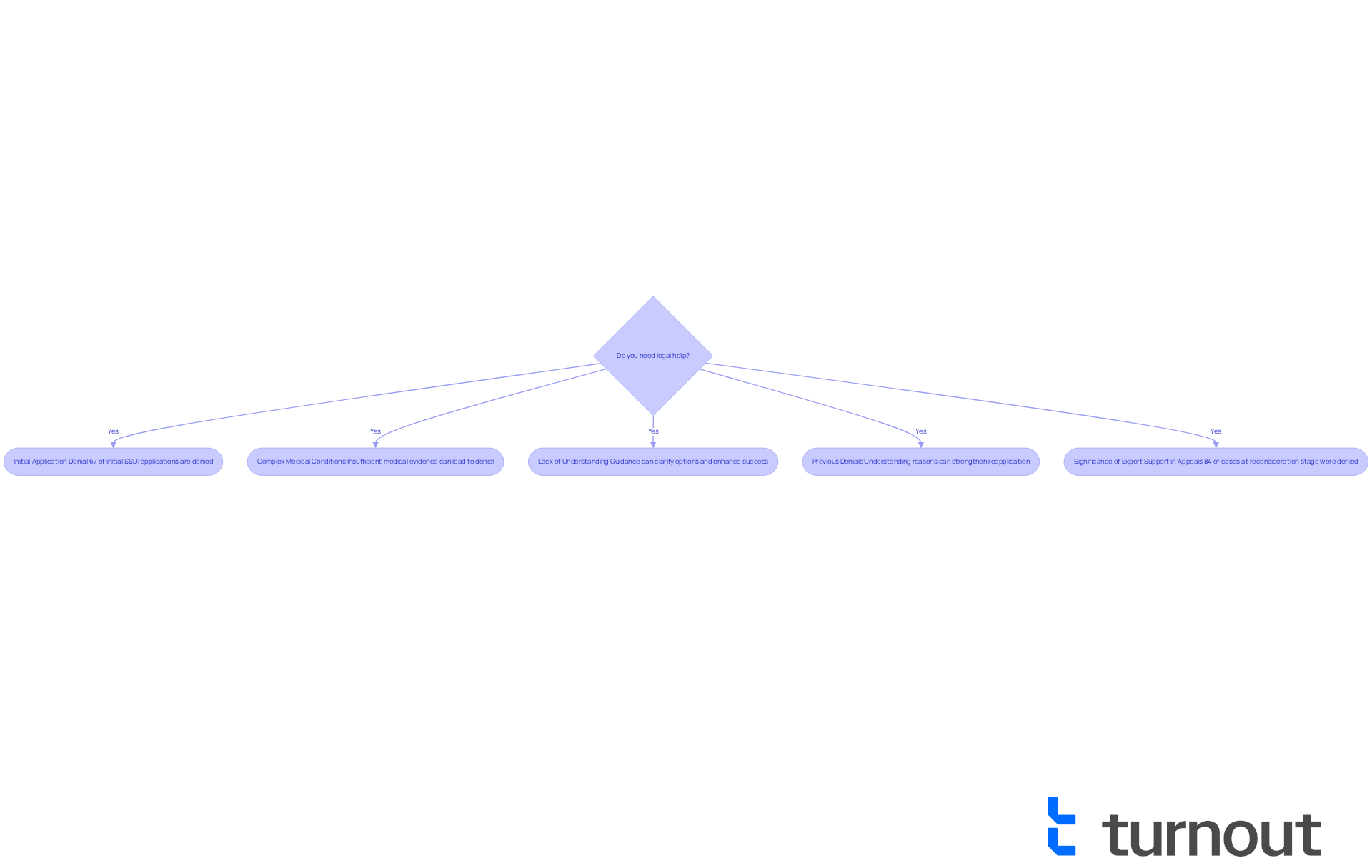
Find and Select a Qualified Disability Advocate
Finding a qualified disability advocate for legal help for social security disability claims can feel overwhelming, but you don’t have to navigate this journey alone. Here are some essential steps to help you along the way:
- Research: Begin by seeking supporters who specialize in Social Security Disability claims. Utilize online directories and local resources to compile a list of potential candidates who can truly understand your needs.
- Check Credentials: It’s important to verify that your representative has relevant experience and a proven track record in managing disability claims. Look for reviews or testimonials from previous clients to gauge their effectiveness and commitment.
- Interview Candidates: Arrange meetings with potential representatives to discuss your case. Ask about their experience, approach, and success rates. Remember, having legal help for social security disability can significantly enhance your likelihood of approval; individuals with representation are three times more likely to succeed in their claims.
- Evaluate Communication: Choose someone who communicates clearly and is responsive to your inquiries. A competent supporter should make you feel at ease and informed throughout the process, ensuring you grasp each stage of your journey.
- Discuss Fees: Be sure to clarify the fee structure upfront. Many supporters work on a contingency basis, meaning they only receive compensation if you win your case. This arrangement can help alleviate financial pressure during the claims process.
By following these steps, you can enhance your chances of securing the legal help for social security disability that you deserve. Remember, experienced advocates can effectively navigate the complexities of the Social Security system, and you are not alone in this journey.
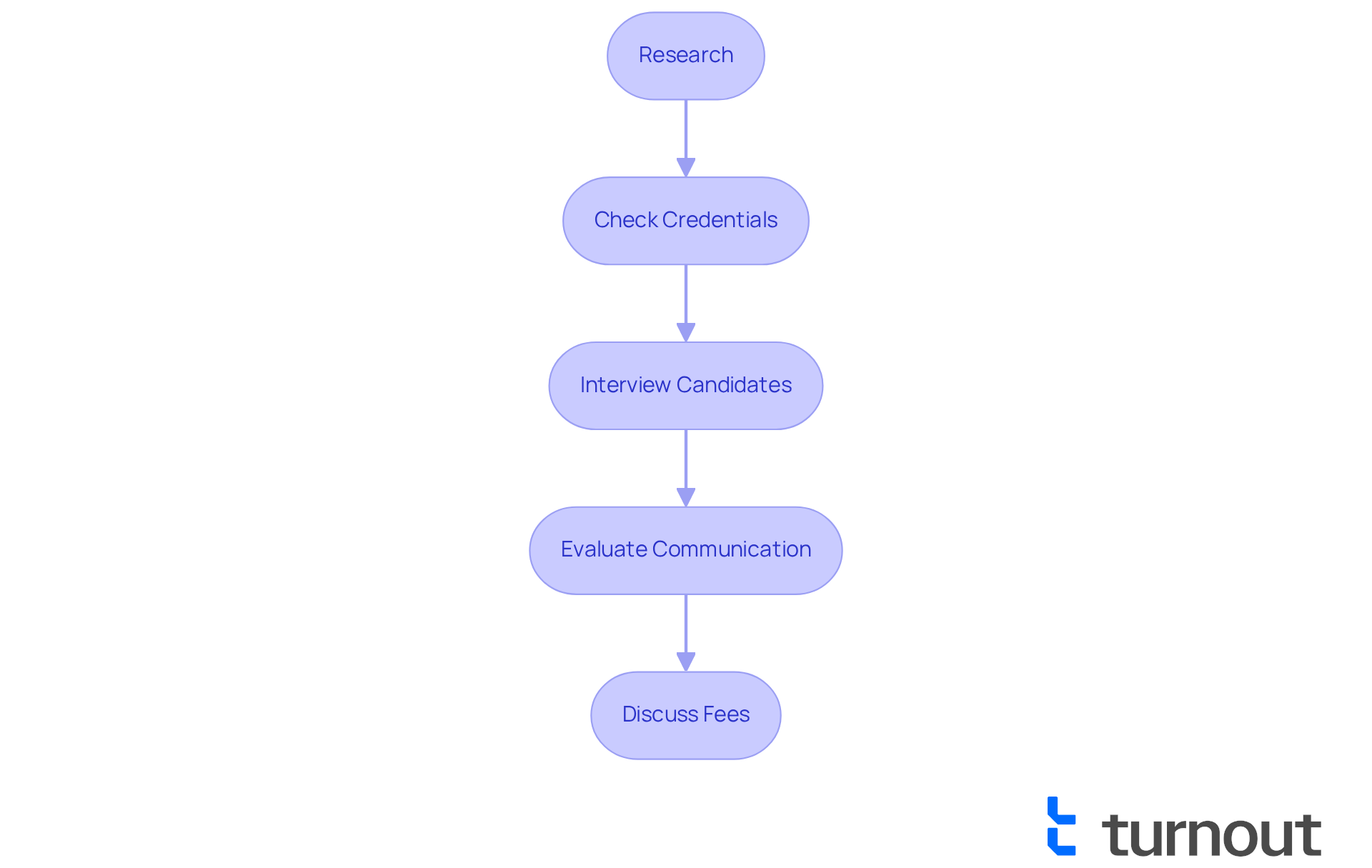
Prepare Documentation and Understand Eligibility Requirements
To prepare your application with the support of Turnout, we understand that gathering the necessary documentation can feel overwhelming. Here’s a helpful checklist to guide you:
- Medical Records: Please obtain detailed medical records from your healthcare providers that outline your diagnosis, treatment history, and prognosis. These records are essential, as about 65-70% of initial SSDI submissions are rejected, often due to inadequate medical evidence. As Christy wisely observes, "When finishing your submission, be thorough about your medical condition and how it impacts your ability to work."
- Work History: Compile a list of jobs you have held in the past 15 years, including dates of employment and job descriptions. This information is crucial for demonstrating your work history, which is a key eligibility criterion.
- Personal Identification: Include proof of identity, such as a birth certificate or identification card. Accurate identification is vital for processing your request.
- Financial Information: If you are applying for SSI, provide information about your income and resources, including bank statements and tax returns. This documentation helps assess your financial eligibility for benefits.
- Disability Report: Complete the Adult Disability Report (Form SSA-3368), which provides the Social Security Administration with detailed information about your condition and its impact on your ability to work.
We know that understanding the eligibility requirements can be daunting. Generally, you must show that your condition prevents you from engaging in substantial gainful activity (SGA) and is expected to last for at least 12 months. In 2025, the SGA threshold is set at $1,620 per month for non-blind individuals. Therefore, it’s essential to provide thorough documentation to support your claim. Remember, original documents are necessary for submission, but certified copies may be accepted if originals are unavailable.
For additional support, consider utilizing the Disability Starter Kits available on the SSA website, which can provide legal help for social security disability in preparing your submission. Please note that Turnout is not a legal practice; we employ trained non-legal supporters to assist with SSD claims, offering expert guidance to help you navigate the complexities of the application process. You are not alone in this journey, and we’re here to help every step of the way.
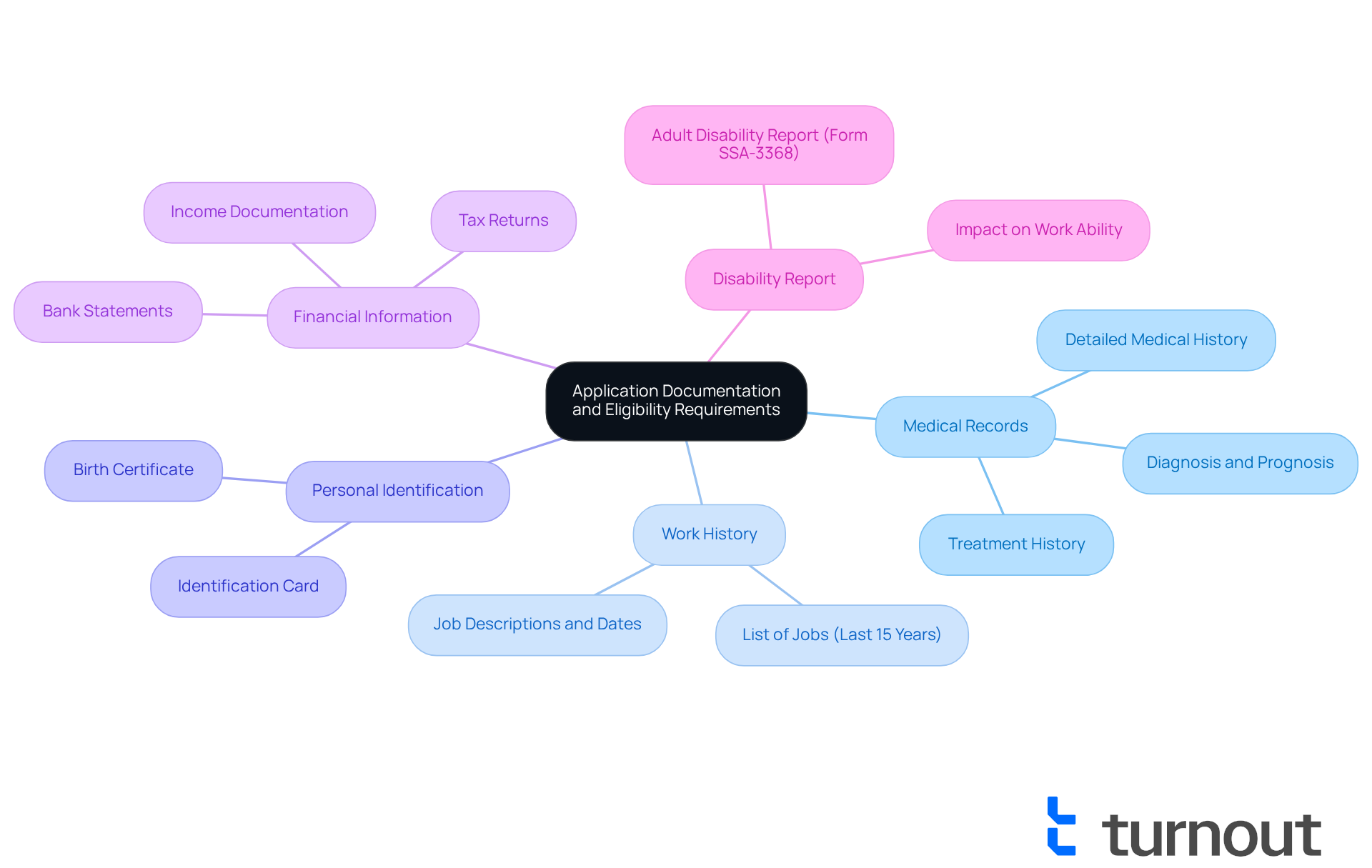
Work Effectively with Your Advocate
To work effectively with your advocate at Turnout, we invite you to follow these compassionate guidelines:
- Be Honest and Open: Share all relevant information about your medical condition and work history. We understand that clarity is essential for constructing a solid case with the assistance of our trained non-legal representatives.
- Stay Organized: Keeping all documents and correspondence organized can make a significant difference. This will help your representative obtain the information they require promptly, enabling a more streamlined approach for your SSD claims.
- Communicate Regularly: We encourage you to maintain open lines of communication. Regular updates on your case status and any changes in your condition are essential for effective advocacy. It's common to feel uncertain, but staying connected can help.
- Follow Instructions: Adhering to any requests or recommendations from your representative, such as attending medical appointments or providing additional documentation, is vital. This cooperation is key to navigating the complexities of government benefits.
- Ask Questions: If you don’t understand something, please don’t hesitate to ask questions. A good advocate at Turnout will be more than willing to explain the process and clarify any doubts you may have, ensuring you feel supported throughout your journey.
Please remember, Turnout is not a law firm and does not provide legal advice. By following these practices, you can enhance the effectiveness of your advocacy experience, ultimately improving your chances of a successful outcome in your Social Security Disability claim while seeking legal help for social security disability. You are not alone in this journey; we are here to help.
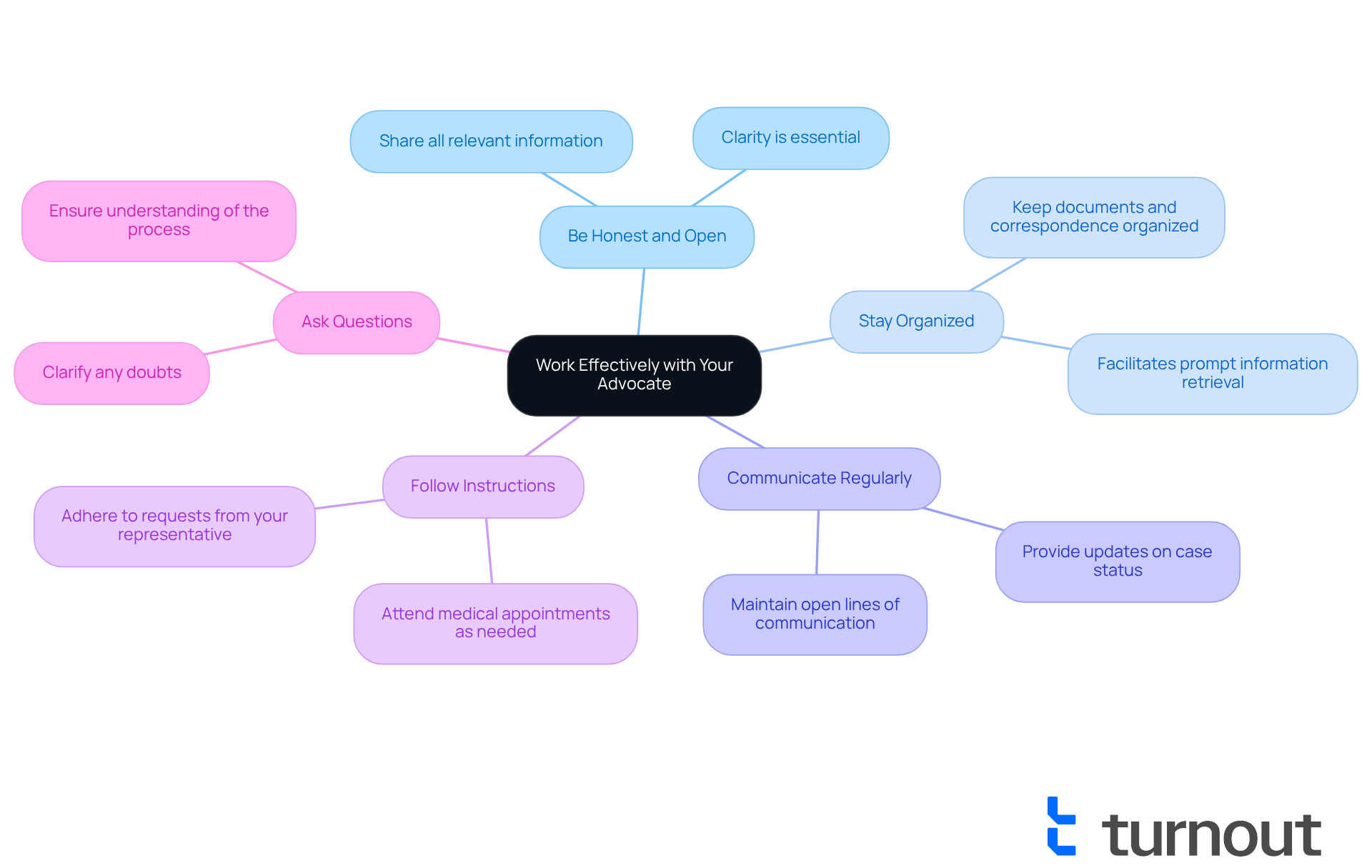
Conclusion
Navigating the complexities of Social Security Disability (SSD) claims can feel overwhelming. We understand that the journey is not easy, but knowing the available benefits and when to seek legal assistance can significantly ease this process. This article highlights essential steps to help you secure the financial support you deserve, emphasizing the importance of both SSDI and SSI programs. With the right knowledge and resources, you can enhance your chances of a successful claim.
Key insights discussed include:
- The critical need for legal help when faced with application denials, complex medical conditions, or previous rejections.
- It's common to feel discouraged during this process, but selecting a qualified advocate can make a significant difference.
- Having the right support increases the likelihood of approval.
- Thorough preparation of documentation and effective communication with your advocate plays a vital role in the claims process.
By following the outlined steps, you can navigate the SSD system with greater confidence and clarity.
Ultimately, seeking legal help for Social Security Disability is not just about understanding the system; it's about ensuring that you receive the support that can transform your life. The journey may be challenging, but with the right guidance and resources, it is possible to overcome obstacles and secure the benefits that provide essential financial stability. Take action today: research qualified advocates and prepare your documentation—your future well-being depends on it.
Frequently Asked Questions
What are Social Security Disability Benefits?
Social Security Disability Benefits provide financial support for individuals who cannot work due to a medical condition expected to last at least 12 months or may lead to death.
What are the two primary programs for Social Security Disability Benefits?
The two primary programs are Social Insurance Disability Insurance (SSDI), which is for individuals who have worked and contributed to Social Insurance through taxes, and Supplemental Security Income (SSI), which supports individuals with limited income and resources, including those who are aged, blind, or disabled, regardless of their work history.
How do SSDI and SSI differ in terms of eligibility?
SSDI eligibility depends on the work credits accumulated through employment, while SSI eligibility is based on limited income and resources without consideration of work history.
How many people receive SSDI and SSI benefits?
As of 2025, approximately 8.1 million people are receiving SSDI benefits, and 7.3 million individuals benefit from SSI.
Why is it important to understand the differences between SSDI and SSI?
Understanding the differences is crucial as it affects how you submit your application and the required paperwork, which can significantly impact your chances of receiving benefits.
When should I seek legal help for Social Security Disability Benefits?
You should seek legal help if your initial application for benefits has been denied, if you have complex medical conditions needing extensive documentation, if you lack understanding of the submission process, or if you have faced previous denials.
What is the denial rate for initial SSDI applications?
Nearly 67% of initial SSDI applications are denied nationwide.
How can professional help assist with complex medical conditions?
Professional help can ensure that all necessary medical information is accurately presented, which is crucial since many SSDI claims are denied due to insufficient medical evidence.
What should I do if I have previously been denied benefits?
Consulting someone who can help strengthen your case for reapplication may be beneficial. Understanding the reasons for previous denials can inform a more robust approach to your next application.
Why is expert support important in the appeals process?
Expert support is increasingly beneficial as the landscape for Social Insurance Disability appeals is evolving. Approval rates are notably higher at the hearing level, especially with experienced representation, making it essential to engage with knowledgeable advocates.




